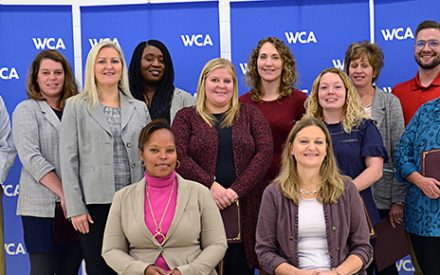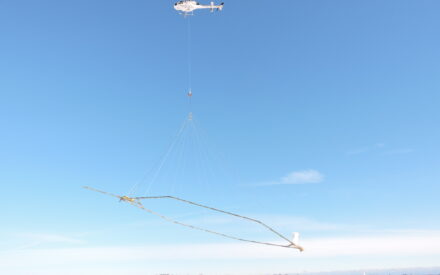Wisconsin is committed to ensuring access to broadband service for all its residents. Recognizing the necessity of high-speed internet in today’s digital society, Wisconsin aims to address gaps in internet access, adoption, and affordability by outlining strategies to achieve universal service by 2030, with goals to enhance broadband deployment and adoption and to improve the affordability and reliability of broadband services. Across the state of Wisconsin, communities have confronted a significant digital divide, with insufficient broadband access impacting the quality of life and economic opportunities for residents. According to the Benton Institute for Broadband & Society, about 79 percent of Wisconsin residents fall within at least one of the federally identified “covered populations” – groups who are disproportionately impacted by the digital divide. In 2023, Extension’s Community Economic Development program prioritized equipping community leaders with the necessary knowledge and resources for effective broadband planning and deployment. These efforts concentrated on supporting community-based planning efforts and crafting effective public-private partnerships so communities, counties, and regions across Wisconsin can secure the resources needed to ensure that every member of the community gains access to this vital resource.
Laying the Groundwork to Expand Broadband Access
Many Wisconsin communities face below-average access to broadband, reflecting insufficient infrastructure and barriers for underserved households. Broadband is increasingly viewed not as a luxury, but as a critical component of economic growth and development.
Extension responded to the broadband disparity through a series of strategic efforts focusing on broad-based education. Key among these efforts was a series of two-day workshops in various regions across Wisconsin, educating community leaders on broadband planning and providing a platform for meaningful discussions on addressing broadband access barriers and gaps. These workshops brought together representatives from nearly all of Wisconsin’s 72 counties, including participants from strategic state and regional partners such as regional economic development organizations, regional planning commissions, and internet service providers (ISPs).
In the early part of 2023, Extension worked with the Public Service Commission’s (PSC) Wisconsin Broadband Office (WBO) to administer county and tribal surveys to better understand broadband in the state. These surveys were an attempt to gather critical data on existing broadband access, serving as the foundation for targeted broadband expansion strategies and informing strategic, targeted outreach efforts for a newly formed Extension broadband team.
Over this same period, Extension hosted a series of eight webinars, facilitating knowledge sharing and collaboration among various stakeholders involved in the “Internet for All” initiative. These sessions covered topics ranging from financing and funding to the use of the newly launched Broadband Toolkit, a valuable resource for communities, ISPs, and organizations involved in broadband expansion efforts including challenges of data and mapping, funding, planning, and public-private partnerships.
Extension helped lay the groundwork for supporting communities to expand broadband access and bridge the digital divide for individuals across the state. Working with the WBO digital equity team to gather insights and stories from various unserved or underserved populations and communities, Extension explored how Wisconsinites use the internet and what barriers they experience, and identified community assets that are valuable for internet access, affordability, and adoption.
These collaborative efforts, spanning virtual meetings and workshops, toolkit modules, and research, have been fundamental in maximizing broadband investments across the state. These activities are also laying the foundation for Extension to support broadband deployment throughout Wisconsin in the years to come. Extension will continue to provide broad educational opportunities across the state and will provide targeted, place-based support that ensures Wisconsin communities can increase broadband access and achieve Internet for All in the state.
Expanding Broadband to Underserved Areas
Extension’s outreach activities have culminated in increased knowledge and enhanced community leadership capacities for broadband planning and partnership formation, which will directly influence the expansion of broadband infrastructure across the state.
Notable efforts around the state involve facilitated discussions, meetings, and presentations with local stakeholders. For example, the Lac du Flambeau Tribe’s formation of a Broadband Implementation Team and the successful acquisition of a broadband grant marked a significant step toward constructing over 235 miles of fiber, ensuring affordable and high-speed internet for 2,300 homes. This outcome, supported by the local tribal educator, stands as a testament to these efforts. Other engagements across the state have enabled participants to learn about best practices in broadband planning and the benefits of building an inclusive digital ecosystem. The impact of these efforts is evident in a more informed decision-making process surrounding broadband issues, better-equipped community leadership, and better strategies for broadband planning and deployment.
Strengthened partnerships with stakeholders enhanced broadband deployment statewide through support in broadband education, identification of access barriers, technical planning assistance, and boosting digital equity. The prime example can be found in Extension’s work with the WBO, WEDC’s Office of Rural Prosperity, the Wisconsin Counties Association, and the Wisconsin State Telecommunications Association. These partnerships involve an assessment of broadband infrastructure, planning, and digital equity in Wisconsin. Wisconsin’s leadership in broadband has set a national precedent, with broadband practitioners and community leaders from over 20 states participating in National Digital Education Extension Team training where Wisconsin played a pivotal role as a presenter.
Finally, Extension worked with the WBO to obtain stories from over 100 meetings held across the state, resulting in strategies that were approved as part of the Wisconsin Digital Equity Plan. Key themes that emerged from these stories included access, affordability, and adoption. This plan will serve as the foundation for the state’s strategy to address the digital divide.
Extension’s comprehensive approach to broadband development is yielding positive outcomes. By prioritizing education, collaboration, and strategic planning, communities are gaining access to improved broadband infrastructure and resources. The impacts are wide-ranging, with increased public support, enhanced digital inclusion efforts, and a more informed citizenry driving Wisconsin’s progress toward a more connected future. Work supported by Extension colleagues across the state has laid the foundation for further success in the coming years, where every resident can access the benefits of broadband internet.
Download Article

 Innovating Local Government by Developing Leaders
Innovating Local Government by Developing Leaders Depth-to-Bedrock: Updated Mapping & Decision-Making
Depth-to-Bedrock: Updated Mapping & Decision-Making Building High-Quality Programs to Help Youth Thrive
Building High-Quality Programs to Help Youth Thrive Nature’s Navigators: Supporting Neurodiverse Learners
Nature’s Navigators: Supporting Neurodiverse Learners


